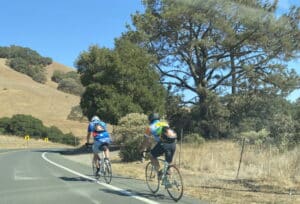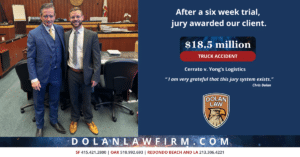
Ray from the Sunset District writes, “I deliver meals for one of the app food companies. Last week, my car was in the shop so I was driving my girlfriend’s new motorcycle when a driver for national package delivery service company pulled out of a driveway without looking and drove right into my path. We collided and I had to go to the hospital for a broken collar bone and some fractured ribs.
The driver claimed I was speeding. At most, I was going slightly over the speed. The driver was not injured but the rear of his van was smashed. His company’s insurance company is demanding I pay for the repair costs. My girlfriend’s motorcycle was a total loss. I have $16,000 in hospital bills.
I found out after the crash that my girlfriend did not have motorcycle insurance. She owns another motorcycle that is insured but hadn’t yet put her new bike on the policy. I have a policy for my car but don’t know if that helps. I asked about my situation on a message board for ride share drivers. One person said I don’t have any coverage under “Prop 213” because the motorcycle was not insured. Another person said I must not tell my insurance company I was delivering meals. What’s the real answer? Aren’t all app drivers covered by the company’s insurance?”
Ray, I am sorry to hear of your collision and hope you are well on the path to healing.
Proposition 213, codified at California Civil Code Section 3333.4, was an initiative the insurance industry snuck by the voters in 1996 to boost its profits by reducing payouts to persons injured in traffic collisions. Section 3333.4 prohibits injured parties who cannot provide evidence that they or the vehicle that they were driving at the time of the collision met the state minimum requirement of $15,000 in liability insurance.
The proposition was what I would call, politely, a deceptive “legislative sandwich” which prohibited DRUNK DRIVERS, uninsured motorists, and FLEEING FELONS from recovering damages for their noneconomic losses (pain and suffering, disability, disfigurement, emotional distress, etc.) while allowing them right to collect for their special damages (medical bills, wage loss, property damage etc.)
The deception was to place the industry’s money maker, denying coverage for uninsured motorists, sandwiched between the despicable criminal elements of drunk drivers and fleeing felons. Trust me, insurance companies were not losing profits to drunk drivers or fleeing felons making claims. They wanted to eliminate their obligation to pay non-economic damages to drivers, who had absolutely zero fault in a collision, but were uninsured. It is always a danger to liberty and justice when someone is penalized because of their status rather than their conduct.
Proposition 213 may not apply in your case. Even though your girlfriend did not have insurance on the bike involved in the crash, check if her motorcycle insurance policy may provide for automatic coverage for any newly purchased vehicle (up to 20 or 30 days). Likewise, you may be insured under your own vehicle policy depending on its contract provisions. Many auto insurance policies provide coverage which follows the driver, not the vehicle.
Why did the other person on the message board tell you not to disclose to your insurance company that you were delivering a meal when the crash occurred?
Most personal car insurance policies have exceptions that deny coverage if the vehicle is used for a commercial purpose. Insurance companies generally charge more for these policies as they know the risk of an accident increases with the greater number of hours driven by commercial drivers.
I don’t know what stage of the delivery process you were in when the collision occurred. If you were not in transit with the food, there is an argument that you were not engaged in commercial activity as you only get paid for the time between pickup and delivery. You should check out your both your and your girlfriend’s insurance policies and request a statement of insurance (declarations page) and copy of the insurance policy from your delivery company’s insurance company.
Several companies now offer auto insurance for rideshare and app delivery drivers. I recommend that anyone engaged in these activities compare policies and purchase the one right for them. Whatever you do, don’t lie and commit insurance fraud. It’s a serious criminal offense.
To attract drivers some app-based delivery companies advertise that they provide drivers with liability coverage under certain circumstances. You should check if your company offered such a policy and whether you are covered.
We are dealing with a suit involving a DoorDash driver who was catastrophically injured when he was hit by a Lyft driver. Lyft is trying to deny our client compensation for his pain and suffering and loss of ability (he is wheelchair bound for life with a serious brain injury) because the scooter which our client had borrowed was not insured at the time of the collision.
DoorDash advertises that it provides $1,000,000 in insurance coverage for “Dashers.” However, when a declaration that our client was covered was sought, James River, the insurance company for DoorDash, said he was not covered, only DoorDash was covered if it was sued. This is a matter which we are fighting vigorously: either he was insured or DoorDash should be held responsible for the damages he will be denied because of their breach of promise to provide him insurance coverage.
Back your case Ray, even if Prop 213 applies, you can bring a negligence action against the van driver to recover monetary compensation for your lost wages, medical expenses, the repair or replacement value (whichever is less) of your girlfriend’s motorcycle and any other out-of-pocket losses. Doing so may also have the effect of preempting the driver’s insurance company from suing you for the cost for repairing his car.
Finally, Ray even if you were partially at fault, you still may have the right to recover damages if the carelessness of the van driver played a substantial factor in causing the collision. California is a “pure comparative fault” state meaning that a victim can bear some fault for his or her injuries but still recover from the person more at fault.
Ray, I don’t recommend that you “go it alone.” Find a well experienced trial lawyer with specific knowledge and experience in dealing with these issues.
By attorney Christopher B. Dolan, owner of the Dolan Law Firm. Email Chris questions and topics for future articles to help@dolanlawfirm.com
Contact A Car Accident Attorney At The Dolan Law Firm Today
If you or a loved one has been injured or killed in a car accident, contact our attorneys today by completing our contact form or call us toll free at 1-888-452-4752 for skilled and experienced legal counsel. We will review your case for free, promptly and with no obligation on your part.
We serve clients across the San Francisco Bay Area and California from our offices in San Francisco and Oakland. Our work is no recovery, no free or also referred to as contingency-based. That means we collect no fee unless we obtain money for your damages and injuries.










